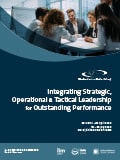An intensive professional development training course on
Maintenance Management Specialist
Why Choose this Training Course?
Professional Recognition and Accreditation
- This is an ILM (Institute of Leadership and Management) Endorsed Programme*
The Course
Maintenance Best Practices are critical for every successful individual and company. This comprehensive 10-day programme has been designed to benefit both qualified new professionals as well as experienced professionals who might need to refresh their skills. It covers all the fundamentals of Maintenance that a suitably qualified professional would be expected to carry out during his duty starting with the first steps and building up in a stair case fashion to a fully functional maintenance organisation.
The Structure
This comprehensive programme consists of two modules which can be booked as a 10 Day Training event, or as individual, 5 Day courses.
Module 1 - Maintenance Management Best Practices: Systems, Tools & Techniques
Module 2 - Maintenance Technology Best Practices: Inspection, Analysis & Monitoring
The Goals
- To provide a step-by-step guide to maintenance best practice starting with foundations and building up to best practice that will deliver maximum business benefits
- To instruct Maintenance optimization best practice techniques
- To provide opportunities to discuss the application of these best practices
- Provide an opportunity to learn these concepts through practical exercises
The Delegates
It is highly recommended that all Maintenance, Reliability, Engineering and technical support staff including leadership and management attend this workshop. If you and your company are interested in greatly increasing productivity, this will be a very valuable course.
The Process
This workshop is designed to be a hands-on, stimulating experience. The program is highly interactive with many discussion and facilitated practice sessions.
The Benefits
Individuals exposed to this training will develop new insights into international best practices. They will learn why the best companies in the world see Maintenance management as the key to delivering the right quality product at the lowest costs.
The Results
Organizations that are exposed to best practice methodologies in the area of Maintenance consistently are able to better compete on the global stage. The participants and their teams are better positioned to positively influence the organization with innovative ideas and techniques that in turn produce a higher performing organization.
The Course Content
Module 1: Maintenance Management Best Practices: Systems, Tools & Techniques
Day One
An Overview of Key Maintenance Work Processes
- Introduction to Maintenance Management
- Definitions of key terms
- Types of Maintenance - Reactive, planned and improvement jobs, Preventive and Proactive
Day Two
Maintenance Management Systems
- Maintenance Planning and Scheduling
- Computerised Maintenance Management Systems
- Developing Maintenance Key Performance Indicators
Day Three
Preventive Maintenance and Maintenance Strategy
- Maintenance Organisation Structure and Policies
- Developing and Implementing a Preventive Maintenance Program
- Applying Reliability Based principles to Maintenance Strategy Development
Day Four
Maintenance Logistics and Cost Control
- Managing Maintenance Spare Parts and Logistics
- Optimising Spare Parts Inventory Levels
- Maintenance Budgeting
- Controlling Maintenance Costs
- Introduction to Life Cycle Cost Concepts
Day Five
Maintenance Team Work
- Engineering, Production & Maintenance Teams
- Benefits of Integrated teams
- Motivation and empowerment
- Total Productive Maintenance Concepts
- Implementing Team Based Continuous Improvement in Maintenance
Module 2: Maintenance Technology Best Practices: Inspection, Analysis & Monitoring
Day Six
Failure of Machines and Inspection Based Failure Analysis
Causes of Machinery Failure
- Wear Mechanisms
- Fatigue
- Fretting
- Corrosion and Electrolytics
Fundamental Machine Problems
- Balance Problems
- Alignment Problems
- Machinery Mounting Problems
Component Failure
- Plain Bearings
- Rolling Element Bearings
- Couplings
- Seals
- Gears Drives
- Belt Drives
Day Seven
Statistical Failure Analysis and Reliability
- Job Feedback and the Importance of History Records
- Pareto Effects
- Elementary Statistics
- Collection, Analysis, Representation and Interpretation of Statistical Data
- Reliability Models
- Maintenance Cost Optimisation
Day Eight
Condition Based Maintenance
The Condition Based Approach
- What to Monitor and Where
- Condition Monitoring Systems
- Trending of Monitored Data
- Frequency of Measurement
- Parameter Symptom Limits
- Remaining Life Prediction
Day Nine
Machinery Condition Monitoring
- General Purpose CM
- Thermal Monitoring
- Lubricant Monitoring
- The Essentials of Vibration Monitoring
- What is Vibration
- How to Measure Vibration
- Where to Measure Vibration
- How to Represent Vibration
Day Ten
Vibration Analysis
- Overall and Spectral Representation
- The Big Five Machine Faults
- Detecting Faults Using Vibration
- Diagnosing Faults Using Vibration
The Certificate
- AZTech Certificate of Completion for delegates who attend and complete the course.
- ILM Endorsed Certificate for delegates who successfully attend and pass the required assessment.
DO YOU WANT TOLEARN MORE ABOUT THIS COURSE?
© 2024. Material published by AZTech shown here is copyrighted. All rights reserved. Any unauthorized copying, distribution, use, dissemination, downloading, storing (in any medium), transmission, reproduction or reliance in whole or any part of this course outline is prohibited and will constitute an infringement of copyright.







